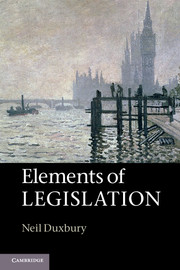6 - Purposivism, past and present
Published online by Cambridge University Press: 05 December 2012
Summary
Sometimes, a judge will interpret a statutory provision so that it yields a meaning which was never contemplated by the enacting legislature but which it can reasonably be assumed the legislature would, had it contemplated that meaning, have been happy to see the statute accommodate. But more often than not, statutory interpretation proceeds on the basis that a provision has a meaning which corresponds to the intention of the legislature in enacting it. Certainly English courts, as was explained at the outset of the last chapter, have traditionally demonstrated fidelity to statutory meaning rather than to actual or presumed legislative intent. When negotiating statutes, nevertheless, judges will usually opt for the convention of statutory interpretation which they believe best minimizes – which, ideally, eliminates – any gap between the meaning of the language the legislature has enacted and an intention it appears to have had.
This can be a difficult objective to pursue. The statutory language might be unclear, or clear but absurd. Ascertaining the intention of the legislature on every contested point of law will be impossible, even if a court is willing to look to legislative history and other external sources that form the background to a statute. Those judges who looked askance at the golden rule saw the core dilemma clearly enough: even fidelity to plain meaning is not a safeguard against judicial legislation; but when, for whatever reason, a statute is interpreted on the basis of something other than its plain meaning, there is an especial danger that a court will determine the law to be not what the legislature wanted, or even what the legislature would have wanted had it thought (or formulated its thoughts) about a matter more carefully, but rather what the court would have liked the legislature to want – even though the legislature appears never to have wanted anything of the sort.
- Type
- Chapter
- Information
- Elements of Legislation , pp. 170 - 240Publisher: Cambridge University PressPrint publication year: 2012

